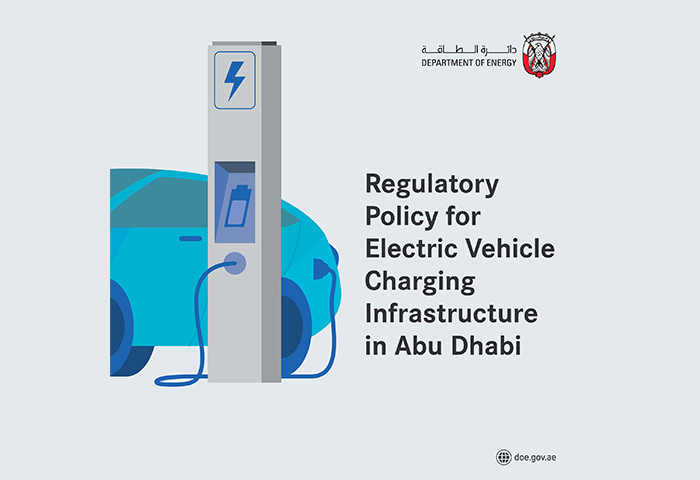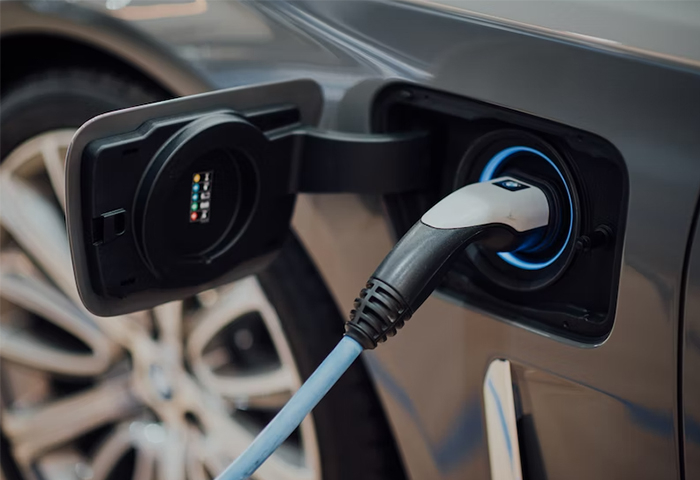In line with its strategy to meet the country’s Net Zero by 2050 commitments, the Abu Dhabi Department of Energy has released the regulatory policy for electric vehicle charging infrastructure in the emirate.
The policy sets out the stipulations and criteria for establishing a network of electric vehicle charging stations across the UAE capital. Included within are the principles for ownership, installation, and management of Electric Vehicle Supply Equipment (EVSE), the electricity supply to EVSE, and the pricing mechanism to end customers.
Aiming to support the transition of the UAE and Abu Dhabi to achieving carbon neutrality within the next three decades, and in line with Abu Dhabi development vision, the policy anticipates a progressive increase in the use of electric vehicles on Abu Dhabi’s roads in the coming years.
“The policy for electric vehicle charging in the Emirate of Abu Dhabi is a significant step for enabling the growth of an EV charging infrastructure in the emirate and is in line with Abu Dhabi’s economic diversification strategies and commitment to the Paris Agreement on climate change. Given that the largest demand for energy comes from the industry, construction, and transport, DoE recognizes that decarbonizing these sectors requires electricity from clean and renewable sources. Therefore, one of our main focuses at DoE is to support the transition of our transportation sector towards electricity and away from fossil fuels, and with the globally proven benefits of increasing the use of electric vehicles that are charged from the electrical grid system, we have built a strong economic and environmental case for growing Abu Dhabi’s EV and EV infrastructure markets.” said H.E. Eng. Awaidha Al Marar, Chairman of DoE.
DoE’s policy supports Abu Dhabi’s Low Emission Vehicle Strategy aimed at diversifying the sources of energy used in the transition towards electrification. It recognises that there is an on-going global move towards the use of electric vehicles that are charged from the electric grid, which - as the energy mix evolves - allows for the increased use of clean energy for transportation and a corresponding reduction of carbon dioxide emissions and other pollutants.
At the present time, the uptake of electric vehicles in Abu Dhabi is still in its infancy, but the DoE has projected those technical developments in the near future are likely to result in increased customer demand for these vehicles that will likely become mainstream in the emirate over the coming decade and onwards.
A key barrier to customers purchasing EV vehicles is ‘range anxiety’ – in other words a concern that they will not be able to find somewhere to charge their EV when using it away from home. The policy will enable necessary investments into this EV charging infrastructure and help tackle this range anxiety. This should in turn, also encourage consumers to purchase and use EV vehicles in the emirate.
Meanwhile, H.E. Eng. Ahmed Al-Rumaithi, Undersecretary of the DoE, explained that the new policy provides the regulatory requirements and guiding principles for up-take of the electric vehicle charging infrastructure, while considering the benefits to customers, the economy and the environment. “With the growing penetration of clean and renewable energy into our grid system, supported by Abu Dhabi’s major solar and nuclear projects, maximizing our EV charging infrastructure and developing policies to support integration of new and emerging EV technologies across the electric grid is very important and will provide a critical route to decarbonize the transportation sector,” he said.
Alongside the DoE, the stakeholders responsible for implementing the policy comprise a number of Abu Dhabi government entities, including the Department of Municipalities and Transport, Integrated Transport Centre, Department of Economic Development, Emirates Water and Electricity Company, Abu Dhabi Distribution Company, Al Ain Distribution Company, ADNOC Distribution Company and Abu Dhabi Quality and Conformity Council.
The Abu Dhabi Executive Council approved the Low-Emission Vehicle Strategy in 2016. Formulated by the Department of Municipalities and Transport, the strategy aims to support the uptake of low-emission vehicles within the Emirate of Abu Dhabi as the world commits to a new energy paradigm.










